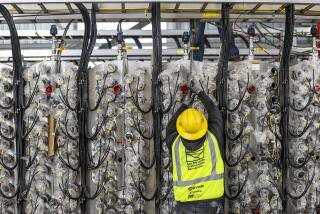Rialto Land Cleanup Payment Set
A portion of the $3 million the federal government spent decontaminating a former weapons site in Rialto will be reimbursed by the landowner and Target, allowing the retailer to build a major distribution center, federal regulators announced Tuesday.
The agreements, announced by the U.S. Justice Department and Environmental Protection Agency and subject to final approval, require the current landowner, Intercoastal LLC of Long Beach, and Target to pay a total of about $970,000.
It remains unclear whether the federal government will ever be reimbursed for the remaining $2.3 million in cleanup costs, said Mark Merchant, spokesman with the EPA’s western regional office in San Francisco.
“As time goes on, hopefully we’ll be able to recover more costs from the responsible parties,” Merchant said.
Intercoastal would pay $640,000 from proceeds of a planned $1.8-million sale of the property to Target, said EPA attorney Thann Cox. Target would conduct some additional tests, pay as much as $330,000 in cleanup costs and be released from future liability by the federal government.
Merchant said the agreement was a good one because the site had been largely cleaned up and would be put to productive new use.
Calls to Intercoastal and Target were not returned.
Federal regulators said Target executives estimate that the development will create 1,000 construction jobs, then 1,300 permanent jobs with a $40-million payroll.
Denova Environmental Inc. owned the land before Intercoastal. Denova, which has declared bankruptcy, and other previous owners may still be liable for cleanup costs, regulators said.
A local activist criticized the agreements announced Tuesday, saying taxpayers are still footing most of the bill.
“I think that coming up with $970,000 out of $3 million that taxpayers paid is not a good deal,” said Penny Newman, who has battled for the cleanup of the Stringfellow acid pits Superfund site in neighboring Riverside County. She said the companies responsible for the pollution, and Target, should be required to pay the full amount. “You have polluters who created this problem who should pay, not the mom and pop who live next door. They [federal officials] have the best bargaining chip right now. If Target wants that property, then now is the time.”
The site was used for storage of explosives and other hazardous substances for decades, including during World War II by the Army, for storage of railcars loaded with weapons. From the mid-1980s through May 2002, the site was owned and operated by Denova and another company, at different times, as a chemical and explosives storage and disposal facility.
State regulators stripped Denova of its operating permit in 2001 after concluding that it was storing twice the legal amount of hazardous substances, mixing incompatible hazardous waste and managing explosives unsafely. They fined the company and its owners nearly $2.5 million, but that money was used to pay for state regulators’ efforts, said Ron Baker, spokesman for the California Department of Toxic Substances Control.
In May 2002, the EPA began emergency removal of hazardous materials and explosives abandoned at the site. In 11 months, workers removed more than 550,000 pounds of explosives.
The Marines were called in a month after cleanup began to move eight tons of explosives to their base at Twentynine Palms for detonation. But more than 1.5 tons of highly explosive material was too unstable to move.
In October 2002, two EPA contract workers were seriously injured when a catapult device used on aircraft exploded.
In other parts of Rialto, rocket fuel and other explosives have contributed to extensive perchlorate contamination of ground water.
Baker and Merchant said there was a strong possibility that because the soil was contaminated at the Denova site, there was water contamination there as well.
“There’s certainly a chance some ground water pollution made it into water wells,” Merchant said. He said it was unclear who would pay for any additional cleanup costs from that type of pollution.
The agreements are subject to a 30-day comment period, which began June 22. Comments can be addressed to the EPA’s San Francisco office.
More to Read
Sign up for Essential California
The most important California stories and recommendations in your inbox every morning.
You may occasionally receive promotional content from the Los Angeles Times.










